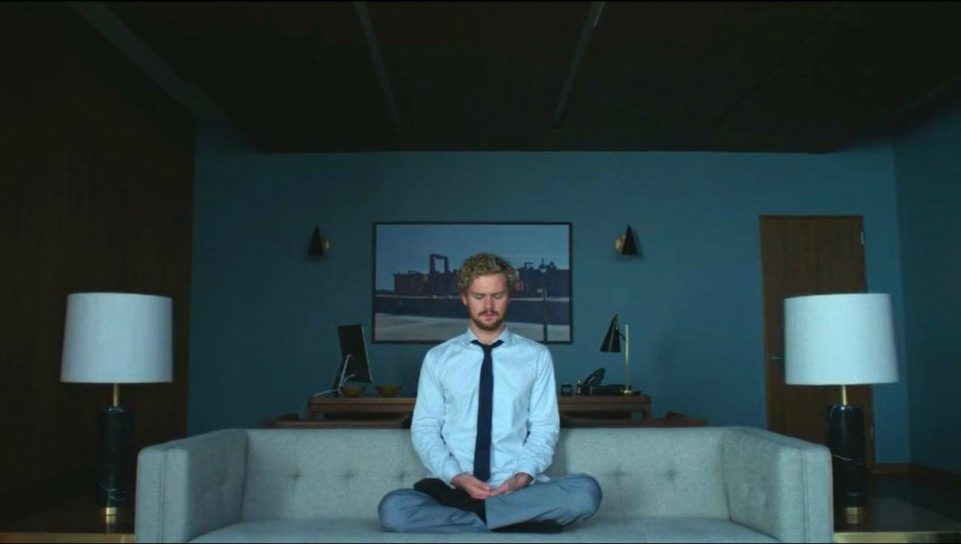'Iron Fist' Review: There's Not Much to Marvel At

Erin Graham ’19 / Emertainment Monthly Editor
Warning: The following contains spoilers for the Netflix series ‘Iron Fist’.
Marvel’s Iron Fist, which arrived on Netflix March 17th, is a superhero flick dragged out over thirteen episodes, splitting fight scenes into thirty-second portions throughout thirteen hours and repeating the same scenes with different faces, a floundering failure of a project subduing an otherwise gripping narrative. With a remarkable 7.6 out of 10 stars on IMDB and an 86% positive audience rating on Rotten Tomatoes, it’s a wonder that the show release was dead on arrival. But with critics on Rotten Tomatoes granting the show only 14% approval ratings, it becomes more clear that, while the show nails some of the classic Marvel superhero elements, the narrative elements dissipate, leaving this body of work more as a skeleton, culminating in a bony and crumbling clenched fist instead of one as strong as iron.

Danny discovers that life-long friends and siblings Joy (Jessica Stroup) and Ward Meachum (Tom Pelphrey) are now running Danny’s deceased father’s corporation. At first, no one believes it’s actually him; little Danny had died years ago with his parents in a plane crash. Enlisting Hell’s Kitchen’s favorite lawyer, Jeri Hogarth (Carrie-Anne Moss), she and Joy use an old clay bowl imprinted by both Danny’s fingers and his name to prove that the rattily-dressed man that claims to be Danny Rand is telling the truth. Danny is welcomed back and given a place on the board.


Episode ten sees the massive bombshell of a plot twist that Colleen is in fact in The Hand, the very organization that Danny was raised to kill. It barely lands as a plot twist at all between the stale acting and weird pacing. With Gao nothing more than a boring captive, we meet Colleen’s old sensei and Villain #2, Bakuto (Ramon Rodriguez), in episode eleven, just as the plot begins to steady itself again. Machinations roil as Ward becomes addicted to Gao’s drugs that are poisoning the people of Hell’s Kitchen, while his ungrateful father continues to abuse Ward and Danny to expel The Hand’s influence. Harold eventually reveals himself to Joy, and with Ward in the hospital, the two work to bring down Bakuto, who is the new leader of The Hand.
Bakuto’s men capture Joy, Harold, and Ward and demand that Danny turn himself in. When Danny runs in to save the Meachums, Bakuto flees. Colleen, Claire, and Danny chase Bakuto and fight him in New York while arguing whether or not to kill him and sever the head of The Hand. In the end, Danny’s K’un-Lun childhood friend, Davos (Sacha Dhawan) plunges a knife into Bakuto’s chest and swears vengeance on Danny for ditching the monastery without warning before running off. Danny and Colleen have an angsty conversation and by the time they turn around, “dead” Bakuto is gone.

It would take essays to describe why the show manages to hit on certain superhero cliches and deliver on important Marvel tropes yet poorly execute so many fundamental narrative aspects, but quite simply it fails because Danny Rand is an awful man. A common motif of the show is Danny forcing himself into spaces; while this works in conjuction with the idea of him fighting to get his name back from where it was taken from him, it fails to make him a good man. We constantly see him kick down doors, strut into meetings, intrude in on Colleen’s dojo, yell and remind everyone at every step that he is a billionaire. How do we love and root for a character who doesn’t fit into his own narrative and pushes his stale, square character through circular holes?

It’d be remiss not to mention the controversy surrounding the show, and rightfully so: the white male learning martial arts from a monastery and returning to America, speaking like he is the master. The way he speaks to a stranger in Mandarin when she is Japanese. The way he forces a date upon her and the writers think they justify it by having Colleen’s eyes beg for help as Claire rescues her. How he speaks about saving the poor and the sick from his leather couch in his mansion while constantly reminding everyone that he is a billionaire. How he explains martial arts to a literal sensei, like she wouldn’t know. How Joy is one of the smartest people on the show and yet is unjustifiably always one step behind her male counterparts. Danny is the ominous spectre of a lack of diversity in TV, always drifting through walls and doors closed to him for spaces that aren’t for him.

Let’s hope Danny Rand ends up defending something far more interesting than his own failure of a show.
Series Grade: C-